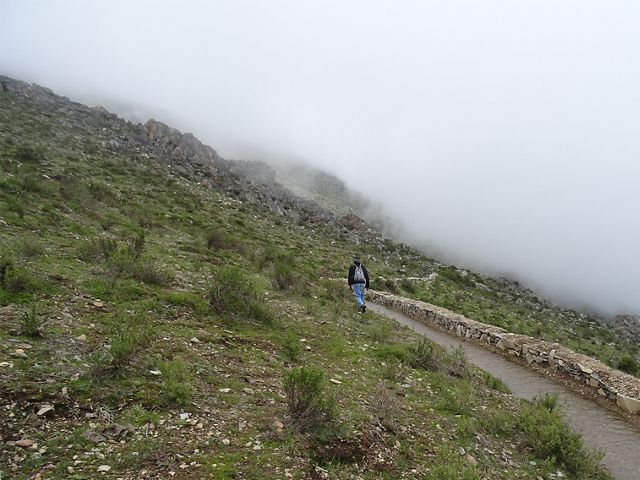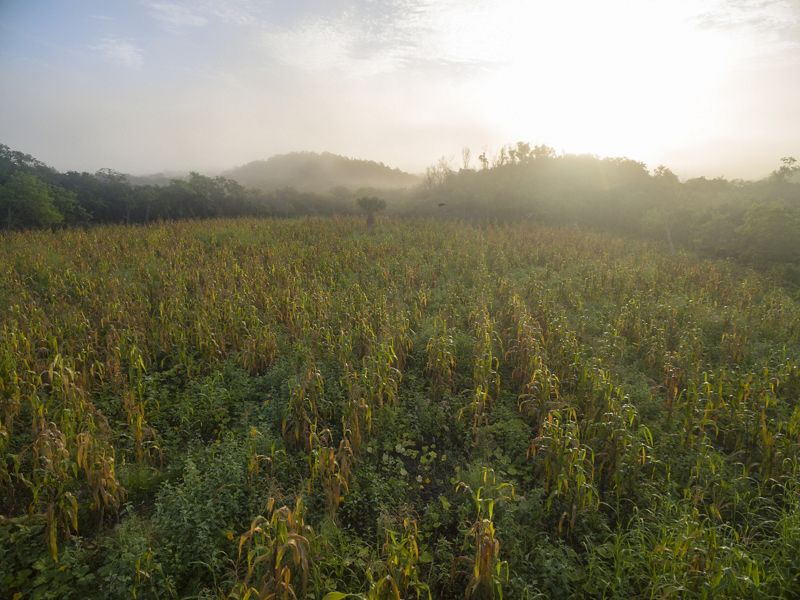
We can feed the planet’s growing population without destroying the natural systems that support all life on Earth.
Aerial view of corn fields Aerial view of corn fields along the edge of the forest in the ejido of San Agustin, Yucatan, Mexico. The Nature Conservancy works with landowners, communities, and governments in Mexico to promote low-carbon rural development through the design and implementation of improved policy and practice in agriculture, ranching, and forestry. The Conservancy is leading the initiative, Mexico REDD+ Program in conjunction with the Rainforest Alliance, the Woods Hole Research Center, and Espacios Naturales y Desarrollo Sustentable. © Erich Schlegel
We are harnessing the regenerative power of nature to restore the health of our soils and oceans, bolstering productivity while building resilience to a changing climate.
A Regenerative and Resilient Food System
Already an agricultural powerhouse, Latin America is the world’s top net food exporter, providing the lion’s share of soybeans, beef, corn and coffee. And all eyes are set on Latin America to maintain global food security as the world’s population rises to 10 billion in the coming decades.
But the convert-and-deplete approach to food production has exacted a heavy toll on the region’s wildlife and the world’s climate. More than half of the forest loss in the world is happening in Latin America, where deforestation is three times the global rate. The region’s agriculture sector has become a leading global emitter of greenhouse gases. Nearly half of Latin America’s assessed fish stock is ranked from fully exploited to depleted.
Can the region strike a balance between expanding agriculture and preserving its biodiversity? Can it demonstrate a way to both nourish and save the planet?
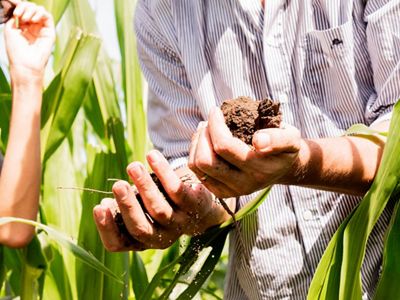
Quote
A regenerative food system is designed to nourish both people and planet
Science, economics, and on-the-ground experience show that it is indeed feasible to increase food production without sacrificing the environment. This is the premise behind TNC’s Regenerative Ranching and Agriculture (R2A) strategy, a game-changing approach that is quickly gaining ground in the region by demonstrating that agricultural productivity prospers when managed hand in hand with preserving the delicate ecological balance essential to our planet’s future.
The initiative has secured an important EUR 20M, six-year grant from the German International Climate Initiative (IKI) to scale these practices in highly biodiverse countries that also serve as agricultural hubs, such as Argentina, Colombia, Ecuador, Paraguay and Peru.
TNC is leading a collaborative effort with Nestlé, the United Nation’s Economic Commission of Latin America and the Caribbean (ECLAC), and the Helmholtz Environmental Research Centre (UFZ), to promote regenerative ranching and agriculture. This multi-stakeholder approach will transition multiple value chains towards practices that enhance climate resilience, biodiversity and productivity for farmers and communities. Aligned with TNC’s 2030 goals, the project will transform three million hectares (7.4 million acres) of agricultural land into regenerative landscapes, reduce GHG emissions by 25%, and positively impact the lives of 22,000 people. Read more


Sustainable and Prosperous Communities
The Nature Conservancy is leading a collaborative effort with partners to support smallholder producers in Southeastern Mexico in transitioning to a new paradigm that harnesses the power of nature to achieve economic and climate resilience. The five-year, USD $30 million Sustainable Prosperous Communities initiative, funded through USAID, is strengthening the capacity of smallholders to transition to sustainable and profitable productive practices and access financial opportunities and markets. During its first year of implementation in 2022, the project impacted more than 5,000 smallholder producers involved in apiculture, coffee, cocoa, livestock, timber, and community ecotourism. More than 300 people received training on topics related to sustainable landscapes. Credit lines were granted to 22 farm and forest producer associations, co-benefiting nearly 4,800 people, and mobilizing more than USD $9 million.
These achievements have led to an additional USD$ 1 million award from USAID to launch an Investment Mechanism with seven Southeast Mexico state governments to promote strategic investments to accelerate flagship initiatives for the conservation and sustainable development of the region.
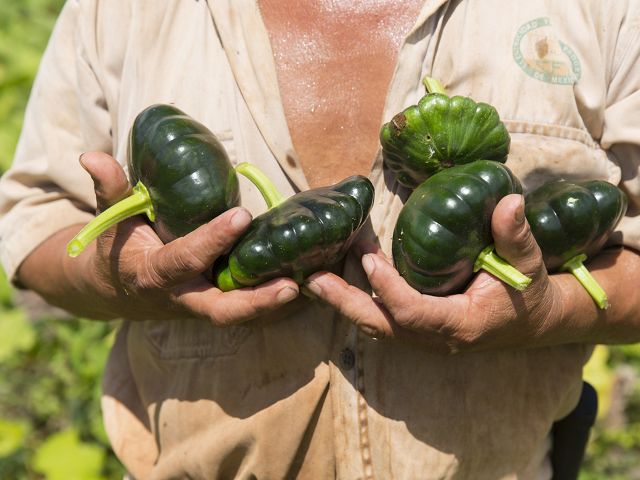
A Song for Sustainability
With over 1,900 bird species—more than any other country in the world—Colombia is a bird watcher’s paradise and one of the world’s most biodiverse countries. Conventionally grazed pastures consume a third of Colombia’s territory and are the leading cause of deforestation and soil degradation. A new study conducted by TNC and partners reveals the potential of regenerative ranching to turn this threat into an opportunity. By adopting these practices, ranchers can help increase bird species diversity by 1.4% to 8.8%. Regenerative ranching not only benefits the environment but also boost farmer’s productivity and profitability. Integrating native trees and shrubs improves soil health, reduces erosion, and provides shade for livestock. To support Colombia’s ranchers in this transition, various organizations, including TNC, collaborated to publish a comprehensive illustrated guidebook.
Quote: Mercedes Murillo
“All living beings are connected. If I take care of my trees, they will protect my animals. Other creatures that live there will also benefit and so will I.”
Mercedes Murillo

Transforming Beef and Soy Production
To halt habitat loss while meeting growing food demands and limiting the impacts of climate change, it is imperative to transform the way beef and soy are produced. TNC is actively working to eliminate the decades-long trend of habitat loss from commodity production, starting in three of the world’s most biodiverse biomes: the Amazon, Cerrado and Gran Chaco of South America.
- TNC and leading agricultural company Syngenta are entering the second phase of our innovative project to halt deforestation in the Brazilian Cerrado by using technology and better practices to enhance farm productivity and recover degraded lands. The Reverte Program is designed to improve soil health, resulting in increased profits for Brazilian farmers and higher yields of soy and cattle.
- In Pará State in the Brazilian Amazon, TNC is providing ranchers and corporations with tools to certify that their beef is deforestation-free. The Conecta Platform is a beef sourcing tool that integrates data on properties, deforestation, and animal transport to trace livestock from birth through the full production cycle. We are working with the government to expand this model to a Public-Private Livestock Chain Traceability System.
- In the Gran Chaco of Argentina, TNC and partners established a platform bringing together the different actors involved in the soybean value chain with the aim of enhancing supply chain transparency and rigor in reducing deforestation. The ViSeC (Sectoral Vision for the Argentina Gran Chaco) platform helps ensure legal compliance, and deforestation and conversion-free sourcing. It also facilitates industry-wide solutions and generates reports that shed light on the dynamics of soy production and land use change in the Chaco biome.


Thriving Fisheries
Making sure oceans thrive through new and better managed protected areas, sustainable fishing, and positive policy changes to how the sea is governed.
Ninety percent of the world’s fisheries lack the basic data needed for good management, putting them at risk from overfishing and affecting both livelihoods and biodiversity. To address this, TNC has introduced FishPath, an online decision-support tool that helps fisheries assess, monitor, and manage their resources, towards sustainability.


Quote: Julio Cesar Paiva
Let’s not only think about fishing today. Let’s also think about being able to fish tomorrow and about our children being able to fish in the future and sustain their livelihoods
Julio Cesar Paiva
Artisanal fisherman, Ancon, PeruIn Chile, we collaborate with government agencies, fishers, universities, local NGOs, and research centers, to apply FishPath for designing a sustainable framework for 14 species of coastal finfish or rockfish. These species hold ecological and economic significance but currently lack legal protection or regulation. FishPath is also being used to create a multi sectoral management plan for the razor clam fishery in Corral Bay, aiming to set an example for other management committees in the country.
In Peru, TNC and IMARPE (Peru’s Ocean Institute) have implemented a nation-wide on-port monitoring program to improve and increase data collection on shark and ray fisheries. The collected data will support stock assessments and management recommendations, contributing to the conservation of these targeted species.
Additionally, TNC, in collaboration with a coalition of NGOs, launched the bi-national project “Por La Pesca” in Peru and Ecuador. This initiative aims to combat Illegal, Unreported, and Unregulated (IUU) fisheries by improving policies, supporting co-management schemes, enhancing capacities of fisheries agencies and organizations, improving data collection and transparency, strengthening the fisheries value chain and market connections, and promoting gender mainstreaming in the fishing sector.
Environmentally and Socially Responsible Fisheries
The Gulf of California is renowned as one of Earth’s most abundant marine ecosystems. From succulent shrimp to prized tuna and sardines, this region accounts for a staggering 70% of Mexico’s annual catch and supports the livelihoods of more than 88,000 people. Nestled at its southern edge lies Marismas Nacionales, Mexico’s largest wetland on the Pacific coast, which plays a pivotal role in bolstering productivity and climate resiliency.
In collaboration with local partners, TNC has launched an ambitious Fisheries Improvement Project (FIP) with a specific focus on enhancing the white shrimp in Marismas Nacionales. Our primary goal is to achieve positive environmental and social outcomes through this initiative. We are delighted to share that the FIP is now part of the Fishery Progress global platform connecting conscientious buyers with environmentally and socially responsible fisheries. The platform ensures transparency and facilitates monitoring of progress.
To ensure a comprehensive and socially responsible restoration of the mangrove forests in Marismas Nacionales, we have implemented a Biological Monitoring Program in conjunction with a Human Rights Guide. This synergistic approach tackles ecological recovery while also prioritizing the well-being of local communities. By fortifying the productivity and resilience of Marismas Nacionales, our efforts benefit those who rely on it for sustenance and livelihoods and also safeguard against the ravages of climate change.


A Superfood for Coastal Resilience
Seaweed, known as a superfood, plays a crucial role in supporting ecosystems. As the “forests of the sea,” seaweed captures carbon, filters water, and provides essential nursery habitat for wildlife, including economically and ecologically significant ones like lobsters and crabs. Strategically located seaweed farms restore coastal ecosystems while simultaneously generating food and employment opportunities. Collaborating with fishing communities, TNC has establish successful pilot farms that serve as models for expansion. This innovative approach has not only provided additional sources of income for fishers but also creates inclusive opportunities for women.
These collective efforts have been instrumental in the development of Belize’s National Mariculture Policy. TNC, in collaboration with Belize’s Fisheries and BELTRAIDE (Belize Trade and Investment Development Service), has actively contributed to shaping this policy, laying the foundation for the sustainable growth and development of Belize’s mariculture industry. By integrating ecological and socio-economic benefits, the policy contributes to ongoing development of the legal framework supporting growth and development of Belize’s mariculture sector, thereby reducing pressure on traditional fisheries. Seaweed farming emerges as a compelling solution, promoting the restoration of coastal ecosystems, empowerment of communities, and driving sustainable economic development.


Saving Water by Saving Nature
Protecting and restoring nature’s inherent capacity to provide clean water can play a pivotal role in reversing water shortages worldwide. First implemented in Latin America and now replicated around the world, Water Funds bring together public, private and community stakeholders to collectively invest in conserving crucial headwaters through nature-based solutions. This frequently entails conserving forests to protect water supplies, restoring wetlands to effectively filter pollutants and adopting improved farming practices to prevent pollution at its source. Nature can often deliver superior outcomes at a significantly lower cost.
Through the dedicated efforts of the Latin America Water Fund Partnership (LAWFP), and with a growing network of local partners, TNC has helped create 27 Water Funds in ten Latin American countries. These collective efforts have mobilized over 350 public and private partners to invest more than USD $240 million to support conservation actions on more than 800,000 hectares (2 million acres) in priority areas, benefiting nearly 104,000 families.
Our latest addition was the Mendoza River Water Fund—Argentina’s first—which will contribute to improving water security in the Mendoza River basin, the epicenter of Argentina’s wine production now facing recurring droughts and daunting challenges.
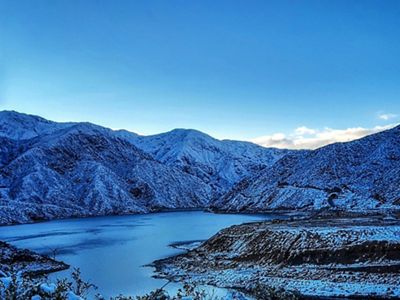
The Economic Advantage of Investing in Nature for Drought Resilience
A new TNC study analyzing the potential advantages of nature-based solutions (NbS) versus current land use practices found that investing in nature can have a significant impact on drought-related expenses. The study assessed the economic repercussions of the 2014-2015 drought in Brazil’s Sao Paulo state, specifically for industries and water supply. The findings revealed that implementing NbS could have reduced drought-related costs by 28%. Essentially, the benefits of avoiding losses far outweighed the costs of implementing NbS. This study underscores the wisdom of investing in NbS to combat the impacts of extreme climate events. Read more
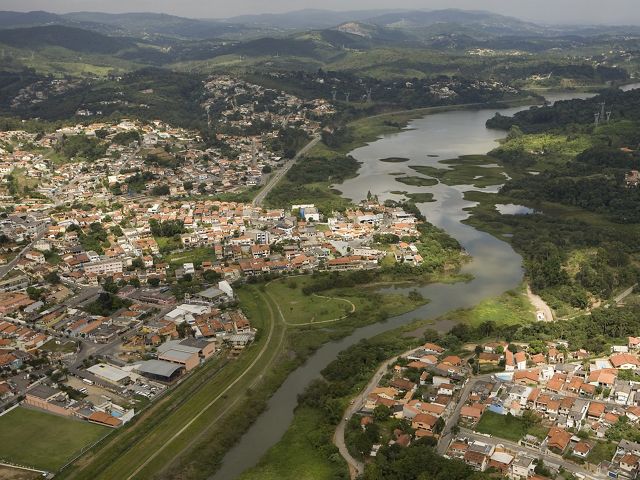
Reviving Ancestral Water Channels
TNC, Aquafondo, AB InBev, and GIZ have partnered on a groundbreaking initiative aimed at revitalizing a network of traditional water channels known as ‘Amunas’ in Peru’s upper Rimac river basin. These channels provide a staggering 80% of the water consumed in Lima, the world’s third largest desert city. The project will establish a monitoring program to evaluate the effectiveness of this ancestral nature-based solution and guide decisions on managing the watershed, preserving freshwater ecosystems, and maintaining environmental services. This exciting collaborative effort has inspired other companies like PepsiCo and Coca-Cola to join forces in this important endeavor.
